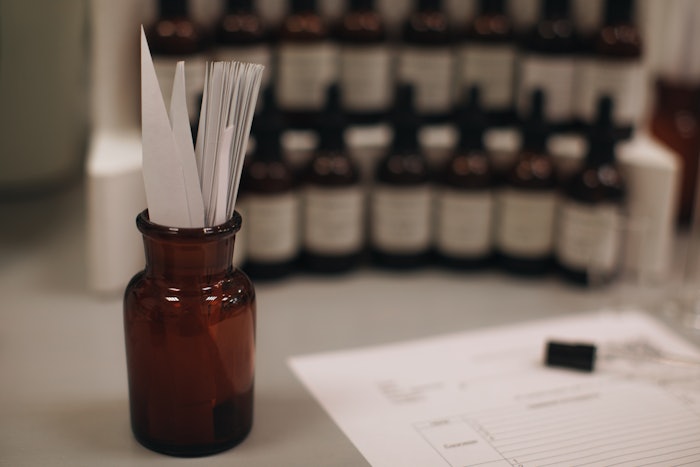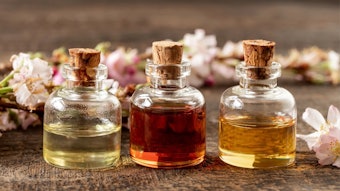
The following letter was shared by head perfumer and director of Olfiction Limited Pia Long. Perfumers can add their signature to the document until July 10, 2023.
We live in a chemical world and life itself is chemistry in action. Our own biological processes produce chemicals and use them for signaling and to function. So do the biological processes of plants. None of this is by design; it is by evolution. Nature is the world’s biggest chemical factory, yet there aren’t tiny people in lab coats inside plant cells, mixing up essential oils. Plants produce chemicals to attract pollinators, deter pests, combat microorganisms and more. The curiosity and ingenuity of humanity has led to the use of natural botanical substances since the dawn of time, first by trial and error, later with additional technology and knowhow.
By volume, 50% of the palette of perfumers today is nature identical. Essential oils, Co2 extracts and resinoids are all natural complex substances—that is to say, they are naturally made up of multiple chemicals. It surprises many people to learn that rose oil is not a single substance, but instead a combination of around 350 molecules. Other essential oils are made up of a couple of dozen components. Some of the chemicals in natural complex substances contribute a great deal to the odor, some less so. Some of the chemicals contained in natural complex substances have hazardous properties.
Raw materials that do not exist in nature are no less safe or safer than natural materials by default. Safety doesn’t inherently depend on just the origin of a raw material. Safety as a concept requires context: dose and exposure need to be determined. Fragrances are already safe as used because our trade is supported by robust science that helps perfumers determine the composition of fragrance and its correct level in a product.
Allergies to specific substances are a different matter—if a person has already become allergic to something, then avoiding the allergen – even if they are included in a consumer product at a level that would not induce an allergy in someone not already allergic—is a wise choice. Ironically, most of our exposure to fragrance allergens comes from everyday activities like peeling an orange.
We, as a society, have become used to relating to the word “chemical” with apprehension - as though the concept of “natural” would be its opposite. This is partly what drives public confusion.
How is fragrance safety determined?
Chemical safety is a human topic. We owe it to ourselves, to our communities, and to our planet to actively and collectively drive policies and everyday actions that protect us all and protect our ecosystem.
The mere presence of a hazardous property does not determine chemical safety. Risk to the user is determined by dose and use scenario. Any toxicologist will tell you that to determine whether something is harmful is an exposure-based conclusion, not a hazard-based conclusion. Even the most hazardous substances are not harmful if the dose is low enough. Conversely, even the most innocuous-seeming natural or synthetic chemical can harm a person if the conditions allow it. It won’t take long for all of us to think of scenarios where water has been deadly, for example.
Fragrances are created by perfumers who calculate the total presence of hazardous components in a formula by using complex tools and software. Our trade has best practice guidelines in place which help us determine the precise composition of the fragrance and its safe inclusion levels in every product type. At the point any fragrance becomes part of a consumer product, levels of hazardous substances have been kept at a level below any adverse effect. Total area of potential exposure, the type of use, the site of use, the product type, and inclusion levels of fragrance are all factors in determining fragrance safety.
The International Fragrance Association (IFRA) is a trade body whose Code of Practice bans, restricts or sets criteria for the use of certain ingredients, based on rigorous scientfic evidence.
The standards are set by IFRA based on safety assessments prepared by the Research Institute for Fragrance Materials (RIFM), with decisions made by an independent Expert Panel for Fragrance Safety.
IFRA is an entity whose role includes harnessing subject matter expertise in all fragrance safety related matters, and one if its key functions is to ensure fragrances are safe as used.
The fragrance industry is the only specialty ingredients industry to have voluntarily instituted safety requirements. These IFRA ingredient safety standards have been so well recognized by the EU Commission, that many have been incorporated into the EU Cosmetics Regulation, as well as into the regulatory framework of other regions such as the ASEAN and MERCOSUR cosmetic regulations.
Why is fragrance under threat?
The proposed concrete actions stemming mainly from the European Green Deal and its policies include calls for abandoning the risk doctrine, and for re-classifying substances in ways that aren’t scientifically driven.
There are currently multiple threats to rational, evidence-based, and scientific approach to fragrance safety.
For example, the European Chemicals Agency (ECHA) is conducting reports known as the Assessment of Regulatory Needs, which itself is not a formal regulatory process, but is having a negative impact on fragrance materials. These reports imply conclusions about chemicals before the manufacturer has even completed their REACH registration. This could lead to completely needless restrictions. The downstream regulations of CLP (Classification, Labeling and Packaging), Detergents, and Cosmetics Regulations are all poised to reclassify or otherwise organize substances in such a way that unintended bans of perfectly safe as used fragrance materials could occur. For example, lemon, thyme, and tea tree oil would be banned as too dangerous to use at any level.
The overall effect of this is to put up to 400 fragrance ingredients at risk. To summarize the main issues is quite a challenge, but it would be fair to say that the proposals under discussion don’t take into account how fragrance safety is already determined, nor do they feel proportionate or rational.
Most importantly: the current proposed actions would not lead to any consumer benefit and cannot be justified on public health grounds.
What are we doing to advocate for science and sense?
A much less known aspect of IFRA’s function is the advocacy it conducts on behalf of our trade, to collaborate and communicate with key stakeholders and help mitigate the potential impact of policy decisions by regulators. IFRA has been instrumental in protecting the perfumers’ palette over the years, as well as the livelihood of fragrance material producing communities like bergamot and rose growers—while at the same time helping the trade adapt when there is a need to do so.
Over the last two years, IFRA has undertaken several projects to inform, advocate and campaign about the above threats, including the highlighting of devastating potential consequences to the communities of natural raw material growing regions. Rose in Bulgaria, citrus in Spain and more are in major threat of being lost through these proposed regulation changes.
Separately, an independent workgroup of perfumers has been crafting a letter with a passionate plea to the EU regulators.
Every person whose favorite fragrance would get discontinued for no reason, every person whose choice would suddenly be taken away; every user of already perfectly safe products that they have had as part of their daily lives for years – let’s think of the impact on people who don’t get to have a say in this. Most consumers are not aware of any threat to their beloved daily rituals or their access to memories unlocked by specific scents.
Please spread the word!
Perfumers looking to add their signature to the open letter can visit https://bit.ly/perfumersopenletter.










